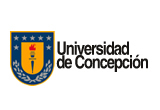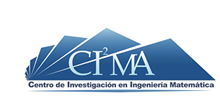News
Traditional meeting that brings together researchers from all areas of the discipline is organized by the PUC of Valparaíso
Since the 1970s, the Institute of Mathematics, IMA, of the Pontificia Universidad Católica de Valparaíso has held Mathematics Week, which this year celebrated its 48th version, as a way of promoting the generation of spaces for dissemination and discussion about mathematics, its applications, teaching and learning, bringing together students and academics from various institutions.
Among the three thematic units included in this year's edition, the Numerical Analysis Session, had the participation of current and former members of the Center for Research in Mathematical Engineering, CI²MA, of the Universidad de Concepción (UdeC).
This is because the session itself was organized by Dr. Patrick Vega, a postdoctorate researcher from the university that hosted the meeting, and included talks by Vega himself, as well as Dr. Rodrigo Véjar Asem (U. de La Serena), both graduates of the PhD Program in Applied Sciences with a minor in Mathematical Engineering from the UdeC; and CI²MA researchers Dr. Rodolfo Araya Durán (Director), Dr. Mauricio Sepúlveda Cortés and Dr. Luis Gatica Simpertigue (UCSC).
.jpg) “It was the first version of this Numerical Analysis session in the context of Mathematics Week, which is the oldest mathematics congress in the country. I hope this is a constant in this traditional event. On the other hand, it is gratifying to mention that this session was organized by a former student of our doctoral program, which makes the influence of the Universidad de Concepción in the development of Numerical Analysis in our country more and more evident”, Dr. Araya comments.
“It was the first version of this Numerical Analysis session in the context of Mathematics Week, which is the oldest mathematics congress in the country. I hope this is a constant in this traditional event. On the other hand, it is gratifying to mention that this session was organized by a former student of our doctoral program, which makes the influence of the Universidad de Concepción in the development of Numerical Analysis in our country more and more evident”, Dr. Araya comments.
Examples of inter-institutional collaboration
Dr. Gatica details that he presented “an augmented mixed formulation for time-dependent Brinkman-Forchheimer equations. The method delivers optimal theoretical convergence rates without the mesh quasi-uniformity condition, improving previous results where suboptimal rates were only achieved under mesh quasi-uniformity conditions for pseudostress-velocity and velocity-gradient of velocity-pseudoeffort formulations”.
The scientist defines the meeting as "a classic scientific event in the mathematical community that turned out to be an excellent opportunity for me to return to face-to-face participation in scientific events, particularly in the area of Numerical Analysis, where I had the opportunity to interact , after a long time that was not possible due to the pandemic, with other national researchers in the area and share what we are doing in terms of research in development and in the future.”
“The presented work”, Dr. Gatica adds, “was led by the former graduate of the PhD program in Applied Sciences with a mention in Mathematical Engineering from UdeC Sergio Caucao, who is currently completing his studies in the Department of Mathematics and Physics Applied from the Universidad Católica de la Santísima Concepción, their project PAI-ANID No. 77190084 of the National Call for Grants for the Installation in the Academy 2019 program.
Meanwhile, Professor Sepúlveda presented “results on conservative numerical methods for solving dispersive equations, such as the Korteweg-de Vries and the Schrödinger equation”.
“These works”, the researcher explained, “are articulated with the work and talk of former doctoral student Rodrigo Véjar Asem, who recently obtained a position at the Universidad de La Serena and who has continued to advance on topics related to the thesis of the. More precisely, after the event I was invited by him to the University of La Serena to continue working collaboratively”.
“The results of this meeting were interesting. Despite being an event with a limited number of participants, it was personally important since it is the first face-to-face event that I attend after two years of pandemic and participation in virtual events”, Sepúlveda highlights. “We were very well received by the PUCV numerical analysis group, which is small now, but is strengthening and consolidating as a research group”.
A similar evaluation was made by Dr. Véjar, who explains, "advances of one of my projects that is also a continuation of my doctoral thesis, which consists of expanding the range of the type of simulations that can be done to model the solutions of the High Order Nonlinear Schrödinger Equation”.
“Specifically”, he details, “the boundary conditions of the problem are considered 'periodic' instead of 'constant and null'. This makes it possible to replicate traveling soliton-type solutions with greater 'realism', saving a considerable amount of memory, since the need to know in advance how far said soliton has traveled is eliminated, which is information that other methods need to know in advance (and this is not always possible). it's known)”.
“This is the first meeting of this type that I have attended in person after the pandemic", he highlights, “a milestone that I personally value, since physical proximity encourages the formation of new collaborations and facilitates the exchange of ideas”.
As a result of the collaboration of the meeting, Dr. Véjar highlights the subsequent visit of six! academics from the Institute of Mathematics of the PUCV to the University of La Serena on November 2, 3 and 4; among them Patrick Vega, who gave a talk for the academics and students of the ULS. One of the objectives of the visit was to initiate conversations so that ULS academics and students have academic work opportunities with PUCV researchers and vice versa. We hope, in particular, to be able to make a new visit to Valparaíso for 2023 and that the collaborations between both institutions will intensify”.
“It was very nice”, he adds, “to have met Patrick, a former colleague from CI²MA, but it is even better to have the chance to work together with him and his colleagues from IMA. I also met some CI²MA professors such as Rodolfo Araya and Mauricio Sepúlveda, the latter my doctoral thesis director. Having shared with them after a long time was very special after what happened in the pandemic, and I hope similar situations can occur with other academics at the center in the future”.
Finally, Dr. Vega explains that in his talk, he reported on "a superconvergent adaptive finite element method for a class of mixed formulations associated with partial differential equations (PDEs) involving diffusion terms. This method combines the ideas of superconvergent postprocessing schemes, widely used in the hybridizable discontinuous Galerkin (HDG) methods, and residual minimization methods in discrete dual norms, whose formulations incorporate residual representations that allow guiding adaptive refinements of finite element meshes". These results are the product of his Fondecyt Postdoctoral project (No. 3220858) "developed in collaboration with researchers Ignacio Muga and Sergio Rojas, part of IMA Numerics."
"This was the first time I was involved in organizing a thematic session", he details. "The invitation we made was very well received, with speakers from various universities, such as the Universidad de La Serena, Universidad Técnica Federico Santa María and a strong presence of universities from the eighth region: Universidad Católica de la Santísima Concepción, Universidad del Bío-Bío and, my alma mater, the Universidad de Concepción. This meeting included various research topics: finite element methods, finite differences and finite volumes (in the context of fluid mechanics, porous media, quantum mechanics and conservation laws), discontinuous Galerkin methods (in electromagnetism) and numerical methods in optimal control of PDEs, as well as the combination of neural networks and machine learning techniques with residual minimization methods to solve PDEs (one of the emerging lines of research at our institute)".
"In addition to the obvious benefit of the return to face-to-face scientific events", Vega pointed out, "this event allowed us both to resume collaborations between individuals and to generate new instances of inter-institutional collaboration, such as the subsequent visit that the researchers from the group of researchers carried out together. research in Numerical Analysis (IMA Numerics) and the researchers of the line of Interdisciplinary Mathematics of our institute to the Department of Mathematics of the Universidad de La Serena".

